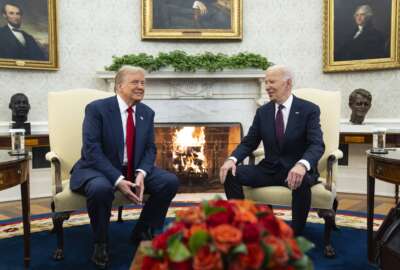Report: CHCOs left out of agency decisions
The Government Accountability Office tells Chief Human Capital Officers to communicate with human-capital staff and coordinate with other agencies to champion s...
By Stephanie Wasko
Special to Federal News Radio
The fragmented community of agency human-capital professionals is too often left out of important agency decisions, according to a new report from the Government Accountability Office.
GAO auditors found human-capital workers lack opportunities to communicate with each other and coordinate across agencies. The report also noted a lack of support from the Office of Personnel Management.
Despite the recent budget upheaval and financial challenges in government, GAO offered suggestions for CHCOs to improve.
GAO recommended that CHCO:
- Strengthen coordination to address a fragmented human-capital community.
- Use enterprise services to address shared challenges.
- Create more agile talent-management processes to address inflexibilities in the current system.
CHCOs need ‘out-of-the-box’ solutions
GAO also looked at how agencies are managing their workforces while dealing with flat or declining budgets. The survey revealed three common struggles within the human-capital community, for which GAO urged “out-of-the-box” strategies to address.
GAO found disorganization within the human-capital community and a lack of a “whole-government” perspective.
“The federal human-capital community is highly fragmented, with multiple actors both inside and outside of government informing and executing personnel policies and initiatives in ways that are not always aligned with broader, governmentwide human capital efforts,” the report stated.
One effect of the poor coordination is an inability on the part of CHCOs to inform budget and legislative decisions that affect the workforce, according to GAO.
GAO suggested working and communicating with OPM to provide better information to Congress and the Office of Management and Budget about budget issues. The report also suggested regularly inviting input from others in the human-capital community for their perspective.
CHCOs feel excluded
CHCOs also struggled with agency leaders excluding them from strategic planning decisions, GAO found.
It’s not necessarily a new problem.
In an earlier 2009 report, GAO encouraged agencies to keep CHCOs involved in the strategic planning process.
But CHCOs in the 2013 audit shared that this did not always happen. When the human-capital community is excluded from deliberations, “then agency decisions may not be fully informed by important data on whether the agency has the necessary skills, how it will obtain these skills, how long the skills will be needed, and how much it will cost to meet program goals,” the report stated.
To successfully complete their missions, agencies must work with their human capital staff to prioritize and create a strategic plan for addressing personnel issues, auditors said.
GAO also suggested agencies take more initiative toward enterprise services. Agencies struggle with many of the same human-capital problems, yet there is little effort to find cross-agency solutions. Instead, agencies, too often, attempt to fix the issues independently. GAO suggested cross-agency collaboration to address human-resource information technology and strategic-workforce planning.
Finally, GAO recommended agencies improve their talent management tools to better evaluate the skills already within an agency and how workers with certain skills can be best placed.
OPM offers agencies many human-capital tools, including workforce-planning models and guidance. However, GAO found CHCOs were unaware of or were displeased with OPM’s help.
GAO concluded OPM must communicate with agencies and tailor their programs to meet agencies’ needs.
Stephanie Wasko is an intern with Federal News Radio.
RELATED STORIES:
From morale to training NASA CHCO answers your HR questions
2013 Human Capital Management Government Training Event
HR leaders, CHCOs demand that Congress let them make the ‘Make the Cuts’
Copyright © 2024 Federal News Network. All rights reserved. This website is not intended for users located within the European Economic Area.





